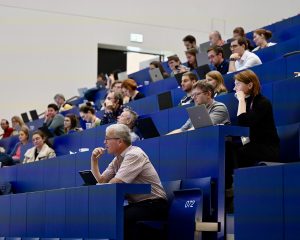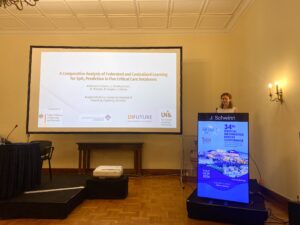On November 30, 2019, in collaboration with DIFUTURE, an information event on multiple sclerosis (MS) research was held at the Klinikum rechts der Isar of the Technical University of Munich, under the direction of Prof. Dr. Bernhard Hemmer. The event welcomed over 270 MS study patients and their family members.
Multiple Sclerosis Research: Large Turnout at MS Information Event at Klinikum rechts der Isar
What happens with my data and samples? What insights into multiple sclerosis can be gained from big data research and clinical studies? Who at the Klinikum is involved in multiple sclerosis research and how? Over 270 MS study patients and their relatives followed with great interest as the Neurology Department at Klinikum rechts der Isar of the Technical University of Munich, under the leadership of Prof. Dr. Bernhard Hemmer, welcomed participants to an information event on MS research at the hospital on November 30th. Ahead of the event, registration numbers exceeded all expectations, necessitating last-minute venue changes and limitations on participation in lab tours.
More than 2,000 MS patients participate in studies at the Department of Neurology at Klinikum rechts der Isar. The objectives of these studies include understanding the causes, progression, and influencing factors (genetics, environment) of multiple sclerosis, as well as predicting and improving individual treatment responses for patients. MS remains incurable.
The high expectations of the numerous guests who gathered in a steady stream in the large auditorium on Saturday morning reflected the significant interest in gaining insights into current MS research. During their presentations, experts explained findings from big data research, such as discovering that many patients develop psychiatric and neurological symptoms more frequently five years before diagnosis compared to control subjects. These symptoms could provide clues to a possible MS diagnosis. Additionally, researchers are investigating the impact of genetic factors on disease risk and progression, as well as the role of vaccinations in the onset of MS. During the subsequent Q&A session, speakers addressed questions before study leaders Prof. Dr. Thomas Korn and PD Dr. Veith Rothhammer guided approximately 100 study participants through the laboratories of clinical and experimental neuroimmunology. At the concluding lunch in the auditorium pavilion, many attendees took the opportunity for personal exchanges with speakers at expert tables.
“We are overwhelmed by the large turnout and positive feedback from patients,” said Prof. Dr. Bernhard Hemmer, Director of the Neurological Clinic at rechts der Isar, about the successful event. “We see how valuable direct engagement with study participants is. It is important for us to let patients know that their participation in studies makes an invaluable contribution to MS research. That is why events like these are so crucial,” Prof. Dr. Hemmer added.
Following this successful kickoff, future events are now being planned.




